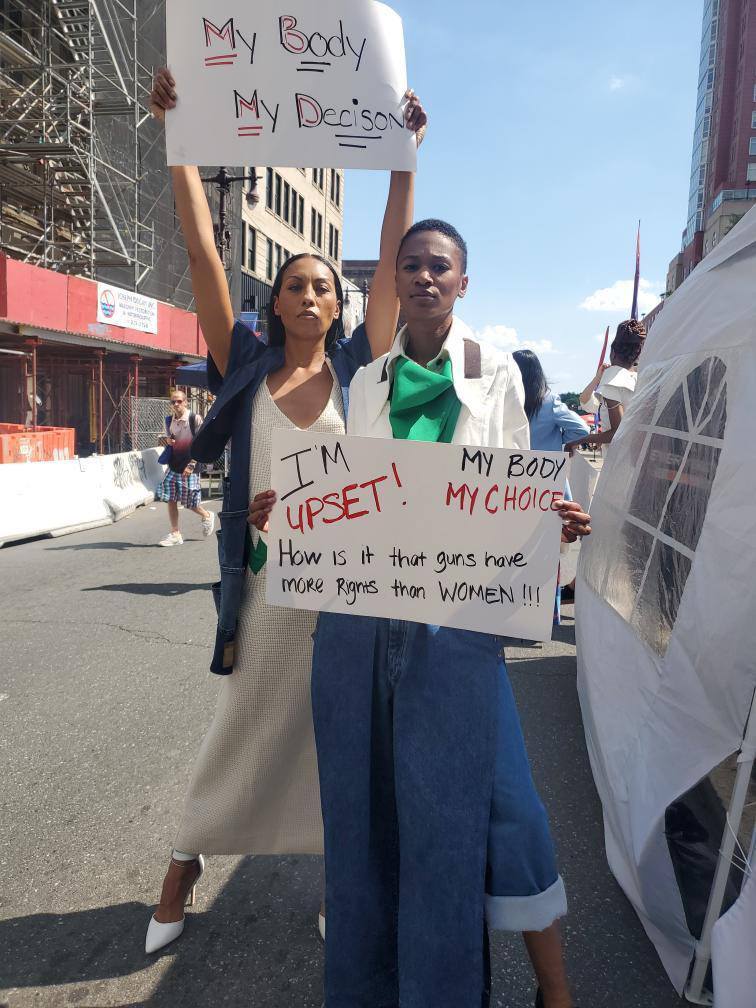This Philly Designer Turned Her Welcome America Fashion Show Into a Powerful Roe Protest
In the middle of Broad Street, designer Nasheli Juliana Ortiz-González and models walked the runway holding posters advocating for reproductive rights.

Models hold up protest signs after the Nasheli Juliana fashion show at the Avenue of the Arts Block Party on June 25th / Photograph courtesy of Nasheli Juliana Ortiz-González
Against the backdrop of Philly’s all-out Independence Day festivities, this weekend took a turn as Friday’s Supreme Court decision overturning Roe v. Wade quickly materialized protests from City Hall to Independence Mall. Fashion designer Nasheli Juliana Ortiz-González, who was part of the runway-show portion of Wawa Welcome America’s Avenue of the Arts block party on Broad Street, had a particularly high-profile platform as a result of this juxtaposition — and she did not let the moment pass her by.
Rather than simply show off her designs, Ortiz-González and models walked the runway holding posters protesting the SCOTUS decision and advocating for reproductive rights.
View this post on Instagram
But the blending of couture and civil rights was nothing new for Ortiz-González.
The designer behind brand Nasheli Juliana and new executive director of Taller Puertorriqueño has always positioned her work at the intersection of fashion and social justice. The native of Puerto Rico began studying fashion at age 13, eventually earning a master’s degree, starting her own line and teaching at Moore College. “Throughout history, fashion has been used in different movements to empower and create a neutral vision,” Ortiz-González explains, giving as a particularly relevant example the green scarf that has come to represent the abortion rights movement in South America. “The garment can create this movement, this power, this energy.”
Past Nasheli Juliana collections have explored Ortiz-González’s heritage and exposed human rights issues. In 2018, she created prints that, upon first glance, look like gorgeous, kaleidoscopic designs, but when viewed with 3D glasses reveal photographs depicting “the eight atrocities the United States has committed against Puerto Rico,” Ortiz-González says. She likened the collection to Puerto Rico itself — on the surface a place of beautiful beaches, arts, and people, set against the backdrop of pain and injustice. “This is America. We have a lot of injustices happening, but the beauty is that we can talk about it.”
In describing her mission, she says, “I think I am taking a space of privilege. Fashion has always been related to a very specific socio-economic context. It’s important that these viewers that have the economic power to acquire fashion understand how much is behind their clothes … behind the action of sitting in a fashion show just to see clothes. So, I like being that disruptive voice.”
That disruptive voice was given a central stage this past weekend. Part of the Welcome America festivities, the block party in and around the Kimmel Center included free concerts, kids’ crafts, a zip line, food trucks, and an “Art Meets Fashion” component, in which Philly Fashion Week designers were showcased on a catwalk in the middle of Broad Street.

A model makes a protest sign to carry in the Nasheli Juliana show / Photograph courtesy of Nasheli Juliana Ortiz-González
The lineup — which also included local designers like These Pink Lips, URBANE, and Prajjé Oscar — had long been set, but the SCOTUS ruling and subsequent protests deeply affected Ortiz-González, who attended Friday’s protest at City Hall.
Ortiz-González decided to incorporate the symbolic green scarves into her show, and to end it with her carrying a protest sign. Then, she reconsidered the solo poster: “I am taking away the voices of the models,” she says. Instead, she gave poster board and markers out to all the models before the show, asking them each to make a statement that they felt passionate about. “It was just giving voice to the women in my runway,” Ortiz-González explains, something especially notable in an industry that often uses women’s bodies as a canvas.
“Assault rifles get more rights than my W.A.P.” one sign said. Another model’s declared, “I’m a Woman, not a Womb.”
“It was beautiful backstage,” Ortiz-González recalls of the after-show experience. She describes how many audience members were girls and their mothers. “It was a lot of young people saying ‘thank you.’”


